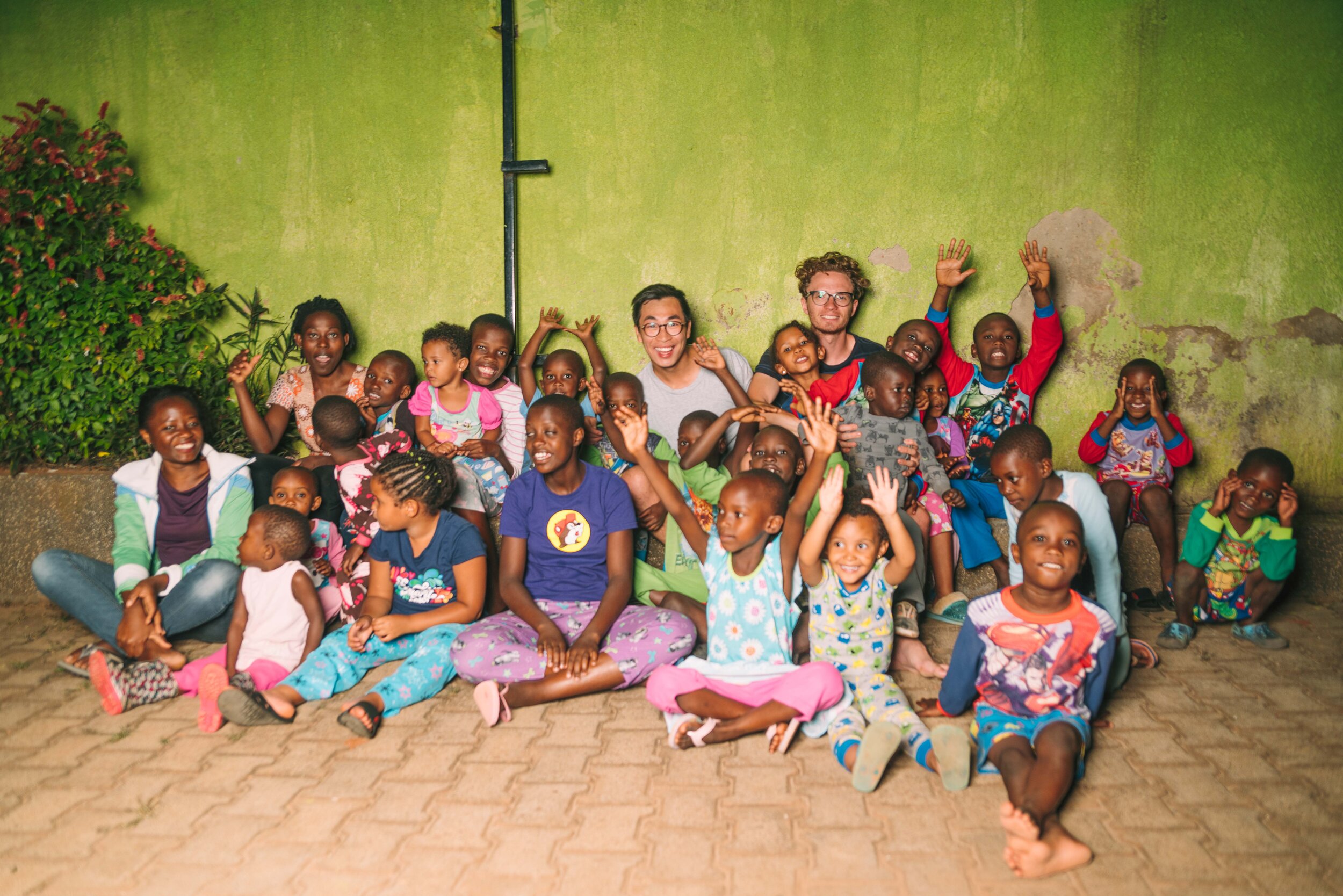INTERVIEW: Marcus Wong & David Chidgzey Part 2
Part 2 of Marcus and David’s interview continues from Part 1 focusing on their joint project ECHO: Stories from East Africa. In Part 2, Marcus and David chats to Yoshika about what drives them to volunteer for small NGOs, the growing scrutiny of charities and the relationship between volunteering and art.
Photo credit: Marcus Wong.
When you say volunteering what exactly does that entail?
M: It was mainly volunteering our skills in media and music, but on the side as well, we would be teaching them and playing with them.
D: Particularly in the first place at the children’s home and the primary school, we helped them with day to day things like preparing dinner, cleaning up, activities, bathing and clothing them. It was awesome. We were also asked to teach at one point, out of the blue, there was no English and everything had to be translated and we were like this is not working… this is not effective.
What drives you to volunteer? Personally and in general, why should someone volunteer?
M: I think there’s a real importance in being with people who are different to you. Who come from different parts of the world, who have different salaries, a different way of living from you. I think it breaks down what we perceive normal to be.
D: I think as well, volunteering is much more about following something that you’re passionate about. And in that sense, you’ll be really effective. I think that’s the reality of volunteering. There’s a need for something somewhere, and in volunteering you’re going to be really effective in doing something for someone, or for a group of people.
M: Especially with NGOs, money is a scarce resource when it comes to charities, so to be able to work with them you have to be able to give a lot and not expect anything back because that’s the nature of NGO work. But it’s very fulfilling to be able to go and give what you’ve been gifted in, there’s a freedom in that.
Photo credit: Marcus Wong.
I saw on your website, Marcus, that you love to use your skills in media in the fight for social justice – this question is for both of you, why is that important and how do you do that? What’s the relationship there?
D: There’s magic that comes with art and from creating something that brings hope, it brings that other element. Obviously there’s the practical things like building stuff which is just as important, but then I suppose there are other things that art and creativity can bring as well in lots of ways – in raising awareness, in just making people happy or giving joy. There’s magic that comes from art that people respond to.
M: I think you have research and statistics which is really thought-provoking. But where art cuts through, it lets you feel something. Art creates common humanity and empathy with people who live in very different places to us, and enables us to connect with people in that space. I think art has a very big voice in that area. Allowing people to slow down, not overthink things and to feel things with other people. It’s changing people through story rather than just statistics.
I’ve heard horror stories about supposed charities and NGOs where they claim to do all of this good, but in actual fact are only doing things for money and to look good. Have you ever experienced this before?
M: There tends to be a growing suspicion of NGOs, which is really unfortunate. And the suspicion is grounded in some truth, that there are fake NGOs and fake orphanages. When I do presentations on these things, people often ask me what is a sign of a good NGO. I think when they have a long term solution, so for example the children’s home we were with, their main goal wasn’t just to house them temporarily, but to resettle them either with distant relatives or to them to get adopted. That was really important.
D: They were really open to posting about that too, when they’ve resettled a child or achieved a long term solution.
M: When you can see it’s run by locals, local people running the NGO where they grew up, you can really tell that they love their community and they’re here to stick around. They’re not just here for the short term, and that’s really encouraging to see. We went with our qualifications in media training, music training, bringing unique skills that aren’t easily accessible there to help people in a unique way. There’s a real importance in exposure trips, to experience something completely different. It can make you question the consumerism mindset that’s taken over in the west, so to be exposed to that stuff is really important. What we’re trying to do is bring that similar experience to people here.
Photo credit: Marcus Wong.
So would you say volunteering in Uganda and Ethiopia for ECHO was life-changing?
D: It just gets you thinking about all this stuff. It’s life-changing, gets you thinking about really big issues and gets you out of your comfort zone.
M: There was a sense of not being able to live the same as I used to, in light of what I’ve seen. When you’ve seen something, you become morally accountable for it. So when I came back from my first trip, I expected to feel really angry at the people here. I was like “how can you live like this?” But the thing is, they didn’t see what I experienced for the past three months. So part of my role is to stand between this gap, between the developed and developing world – a gap that’s increasing – and bridge this gap.
D: And this goes back to talking about art. This is something that only art can bring. You can convey emotions, stories and feelings through art, which is why art is so important. It can bring that home to people here, to bridge that gap.
M: What’s exciting about ECHO, when we were conceptualising what it should be like, was that we’d never seen anything like this done before. We want this to be something like sitting down and watching a film. Then you go from sitting down, and you get up. And then there’s live speaking and live music; bouncing between these mediums in a seamless experience, and to be and to feel.
David, is the music for the ECHO documentaries similar to what you do with your band Chidgzey? How was the process of the sound design?
D: I’d say it’s completely different. Marcus would do the film cuts and send them to me without sound, but when you start writing to these images and videos, it kind of just comes alive. It’s completely instrumental.
M: But with the ECHO Exhibition, there’ll be covers, songs with themes that tie together with the documentaries. We gotta keep it a secret though. I remember when I sent David the cuts I did, and he sent back some music, I remember just sitting there, eyes watering, because it was so touching. To hear something that moves with the film, it’s beautiful. It’s amazing.
D: I guess when we’re making it, we put ourselves back to where we were because it was such a special place and time and experience. It’s really special.
Photo credit: Marcus Wong.
It sounds like you had a lot of fun working together, do you think you’ll collaborate with each other again in the future?
Both: Yeah I’d love to, totally.
M: This is funny, because we spent 45 days together, and I’ve never spent that much time with someone.
D: Yeah it’s weird, we got to one point where we were like “This is day 42…”
M: And I was like, “is this what it’s like to be married?” We didn’t even have a single argument, it was amazing.
D: Maybe if we had spent another day… maybe it would have turned out differently.
M: It was a really stressful situation as well! Really pushing ourselves to the limit.
D: I’m glad we didn’t have an argument or tension between us. That would have been horrible.
M: It was good, so fun.
Catch Marcus and David at ECHO: Stories from East Africa on Saturday 30 November. Next up for Marcus is a trip to Bangladesh in January helping out small NGOs with media consultancy, you can keep up to date with his work here. David’s band Chidgzey is also releasing their second single ‘This Place’ and is having a single launch at Mojos Bar Fremantle Sunday 1 December.
INTERVIEW BY: YOSHIKA KON WITH HELP FROM SIMEON NEO.





